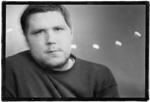Damien Jurado fans, be advised: The Seattle troubadour’s new CD, Postcards and Audio Letters, is a marked departure from his previous work. Don’t panic. This isn’t a foray into trip-hop or free jazz, nor has Jurado opted to refashion himself as a glam act, ࠬa most of the Sub Pop roster. In fact, the disc doesn’t include any music at all, though it still features the emotional immediacy that distinguishes his work. And if you’ve ever donated an old answering machine or a box of discarded cassettes to a thrift store, you just might be a guest star on it.
Postcards and Audio Letters showcases selections from Jurado’s collection of more than a hundred cassettes of taped correspondence and phone messages, purchased second-hand for pennies. As in the work of London artist Scanner, who bases moody compositions around phone conversations plucked electronically from the ether, the fact that these excerpts were never meant to be heard by outside ears renders them remarkably compelling.
Jurado’s hobby dates back to 1997. “I remember going to the now-defunct Shop & Save in Ballard, where I found most of these treasures,” he begins. “They had these two massive tape bins. I was just looking for crazy ’80s bands, and came across a tape that just said ‘Christmas 1983’ on it.” Curious, the singer popped it in his Walkman. What he heard was a cantankerous grandfather with a ghetto blaster, cajoling his kinfolk into impromptu interviews; caught with their guard down, his subjects sound touchingly vulnerable. “I felt almost like I shouldn’t be listening to it,” Jurado admits. “But I thought, ‘Somebody gave this up, so I’m going to buy it.'”
The tape exerted an eerie pull over him. “I started listening to it nonstop, to the point where I’d memorized everything they said, and found myself reciting it, almost like you’d sing a song. I became so obsessed that I started driving around the area where it was recorded, somewhere in Shoreline or Richmond Beach. I knew that because one woman on the tape says she’s from Richmond Beach. Then it dawned on me that it was 1983 when this was recorded, and none of those old people are probably still alive.”
Jurado started scouring the Shop & Save several times a week. “Then I discovered the answering machine section and started taking tapes out of those, too.” But it wasn’t until he shared his secret with a friend, local author Adam Voight (Bridges With Spirit), that he realized others might appreciate these discarded artifacts as well. “Adam heard them and was just blown away.” Voight’s independent publishing company, ChapelleTNI, put out the finished disc in conjunction with local label Made in Mexico, which had previously issued an EP of Jurado’s songs.
“They’re kind of like documentaries for blind people,” Jurado says of the tapes’ evocative appeal. “Since you’re not actually seeing anything, your mind is providing the picture, what the people look like.”
Unlike premeditated notes or letters, these missives are rough, unrehearsed. In “Robert 1972,” the protagonist rambles into a microphone for 30 minutes, trying to rectify his feelings for an estranged lover. “It’s very depressing, because he has no idea what he wants,” observes Jurado. “The fascinating thing about his [tape] is he’s taping over the message she’s sent him, and hers is bleeding through. You can hear some of the things she says, which is cool.”
Since these recordings weren’t originally intended for public consumption, sometimes the contents prove unsettling. On “Our Kid Is Getting Hurt,” a divorced mother and father argue violently over custody of their child. Jurado found this tape especially disturbing, “because that was something my own parents had gone through. Listening to it brought up bad memories.” At first, he was reluctant to include it. “Then I thought, ‘Screw it, let’s put it out.’ If it offends people, that’s fine. Sometimes life is offensive.”
According to Jurado, Postcards and Audio Letters bears more in common with his musical recordings than one might assume. “The tapes have been a huge influence on me as a songwriter,” he says, crediting them for inspiring many of his recent tunes. “In almost all of my writing now, I’ve taken things from the tapes, or I base characters on these people.”
Jurado isn’t certain who the disc’s audience will be, but he does have a little bit of an agenda. “I hope it would encourage people to document their lives and save their memories,” he says. That’s certainly the effect these materials have had on his family. “My wife and I are expecting our first child next month,” concludes the singer. “And this week, we’ve been talking to him on a cassette recorder . . . telling him about the Kingdome imploding.”






